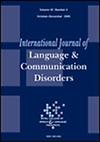Social–Emotional Functioning and Quality of Life in Language Disorders: A Systematic Review of Development From Childhood to Adolescence
Abstract
Background
It is well-established that children and adolescents with developmental language disorder (DLD) have social–emotional difficulties. This is reflected in their behaviour, for instance, by (social) withdrawal, hyperactivity or difficulty with peer relations. Children with DLD are also known to have poorer quality of life (QoL). This is likely to be related to social–emotional difficulties, for both concern similar developmental domains but from a different point of view. Findings on the social–emotional abilities, QoL and predictors thereof in children with DLD are inconsistent across studies.
Aims
This review investigates how social–emotional functioning (SEF) and QoL develop from childhood into early adulthood in children with DLD. These developments are then compared and predictors are identified.
Methods & Procedures
A systematic review of 128 articles, conducted following the Preferred Reporting Items for Systematic Reviews and Meta-Analysis guidelines in January 2024, yielded 34 articles for inclusion after qualitative assessment. Clinical populations were labelled differently (e.g., DLD, specific language impairment (SLI), language impairment (LI)) but adhered to inclusion criteria for language disorder (LD). The majority of the articles focused on SEF (n = 30 articles), while the remaining examined QoL (n = 4 articles).
Main Contribution
This is the first review to simultaneously investigate SEF and QoL in children with LD. No single developmental pattern was found for SEF: a range of possible developmental trajectories exists. Interestingly, prosocial skills generally appear to improve over time, whereas children also experience increasing problems with peer relations. Few studies employed a longitudinal design regarding QoL, but those that did suggest that children with LD are likely to have poorer and declining QoL, at least between the ages of 4 and 9. The sole study examining SEF and QoL in the same sample found a predictive relationship between early SEF and later QoL. Linguistic abilities were predictive in less than half of the studies on SEF development and had little impact on QoL development. Findings on other predictors were inconsistent.
Conclusions
Despite their interrelatedness, SEF and QoL do not necessarily develop similarly in children with LD. Only one study examined SEF and QoL in the same children and found contrasting developmental trends. This could imply that SEF and QoL are not as intertwined as presumed. It also remains unclear what best predicts change over time in these two dimensions. More research is necessary to further examine the relationship between SEF and QoL, as well as to identify potential predictors.
WHAT THIS PAPER ADDS
- Children with LD are more likely than their peers without LD to have lower SEF and poorer QoL. However, the development of these domains across childhood and adolescence remains unclear. The relationship between SEF and QoL is equally under-researched.
- This is the first review on those with LD that takes a longitudinal perspective on both SEF and QoL and looks at their relationship. It highlights that longitudinal research is valuable and necessary, specifically for QoL, where studies are scarce. Only one study examined SEF and QoL in the same group of children and found a predictive relationship between (aspects of) SEF and later QoL.
- This study highlights the relevance of longitudinal research when aiming to comprehend development, particularly in heterogeneous populations such as language disorders (LD). Clinicians are advised to address social–emotional problems alongside language to potentially increase SEF and QoL. Future research should investigate SEF and QoL simultaneously to substantiate the preliminary evidence for this relationship between SEF and QoL. Additionally, future studies consider support and multilingualism as potential predictors of this development in children with LD.


 求助内容:
求助内容: 应助结果提醒方式:
应助结果提醒方式:


